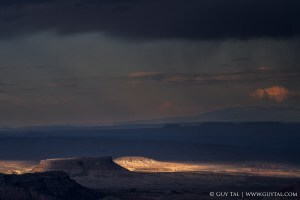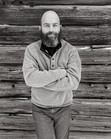The Fear Factor
A few updates:
I’ve recently had the pleasure of speaking with Beth Buelow, host of the excellent video podcast, Pixels. We covered a broad range of topics, including creativity, expression, and ethics. If interested, you may find our conversation here.Thank you for your continued interest in my work, and a special thanks to those of you who generously support me on Patreon. This (ad and sponsor free) blog would not be possible without your support.
—Guy
Fear follows hope. I do not find this surprising. Each is the mark of a mind in suspense, a mind troubled by awaiting the future. The principal cause of either hope or fear is that we do not adapt ourselves to the present, but send our thoughts far ahead. Thus foresight – the greatest blessing of the human condition – is turned into an evil.
—Lucius Annaeus Seneca
In his treatise, A Philosophical Enquiry into the Origin of Our Ideas of the Sublime and Beautiful, Edmund Burke wrote, “whatever is in any sort terrible, or is conversant about terrible objects, or operates in a manner analogous to terror, is a source of the sublime; that is, it is productive of the strongest emotion which the mind is capable of feeling.” Later in the same text, he added, “No passion so effectually robs the mind of all its powers of acting and reasoning as fear.”
The sublime, as well as other powerful experiences such as being confronted with vast vistas or assimilating the implications of profoundly meaningful realizations, manifests in the blend of emotions described as awe. The Oxford Dictionary defines awe as, “a feeling of reverential respect mixed with fear or wonder.” (my italics)
None of us wishes to feel fear, but fear (when not irrational) is nonetheless one of the most useful emotions we possess, and a critical one to such things as self-preservation, empathy, and ethical living. It’s why I’m always perplexed to see products and people branded with such slogans as “no fear.” True fearlessness—as in entirely lacking the emotion of fear—is, if anything, an indicator of some severe psychological disorders and emotional deficits. Likewise, a “fearless leader” is the last person you would want to follow into a situation involving existential risk of consequential moral choices. Rather, the qualities to be revered most highly in a leader are integrity and courage. The distinction, as Mark Twain put it, is this: “Courage is resistance to fear, mastery of fear—not absence of fear.”
A life lived largely or entirely in avoidance of fear is, as the definitions above suggest, also a life lacking in awe and tests of courage. There is a good reason why many people partake willingly in risky adventurous activities, enjoy scary movies, and dare to put themselves “out there” despite fear when confessing to another person (or publicly) such things as sincere emotions, doubts, hardships, helplessness, guilty feelings, insecurity, or transgressions for which they seek remedy or absolution. While none of these things may be described as pleasant, easy, or comfortable, all may result in a profound exultation of life: in shaping one’s character to become stronger and more resilient, in forging meaningful relationships, in enabling at least a chance for people to achieve the greatest accomplishments they are capable of, and in transcending the dullness, boredom, and banality of so much safe and “ordinary” living.
But fear is involved not just in risky actions or external challenges; it may also be a barrier to self-examination of choices, opinions, beliefs, and ethics—in a greater sense to the sincere pursuit of truth and commitment to one’s values. “To conquer fear,” wrote Bertrand Russell, “is the beginning of wisdom.” The thing to fear is not, as Franklin D. Roosevelt suggested, fear itself, which in some cases may be very useful, but rather certain kinds of fear: irrational fear, overly exaggerated fear, debilitating fear. Since fear is an inevitable component of some of life’s most elevating and meaningful experiences and choices, and the reason they are so, to fear all fear is also to fear life, or at least some important and powerful life experiences.
I have had to contend with various flavors of fear on many occasions throughout my life. In fact, being a contemplative type, fear is a daily companion to me, and enters in some way into every experience involving thinking about my life, my mortality, my future, my relationships, my goals. I have learned the importance of not avoiding or suppressing such fears, or denying their implications. Indeed, I would not have had some of my most important and (at least in hindsight) meaningful experiences and accomplishments if it were not for choices made in the throes of—and despite of—fear: choices that would not have seemed so momentous and life-affirming if they did not involve overcoming fear. “Freedom and life,” wrote Johann Wolfgang von Goethe, “are earned by those alone who conquer them each day anew.”
How does one conquer fear? For me, one of the most effective strategies in facing real (as in not irrational) fear has been, perhaps appropriately, also rooted in the experience of awe. In their paper “Approaching awe, a moral, spiritual, and aesthetic emotion,” Dacher Keltner and Jonathan Haidt characterized awe as (among other things), “emotional experiences that involve perceived vastness.” (Italics mine) To me, the most calming times, when I feel most at peace with my life, my choices, and whatever the future may bring me, are times when I feel—intuitively or by consciously prompting myself to feel—the vastness of the world and my place in it. When I consider the immense expanses of space and time and the relative infinitesimal minuteness in comparison of such things as a human life, all of human lives in all of time, indeed of all material existence in all of time, I feel assured that nothing I am or do matters in any objective sense: that for reasons not known (and likely not knowable) to me, I have come into existence for a tiny blip of time, and that the one overriding concern I must have is to do my best to make this tiny blip of existence as interesting and meaningful to me as I can before it vanishes into near nothingness in the great expanses of all existence.
As for irrational and overly exaggerated fear, these may be easily dispelled with the help of formal logical arguments, evidence, and—which may surprise you—statistics. But that may be a topic better left for another post.
It is twilight. I am starting a new life in a new place, figuring out things I believed until not too long ago I would never have to figure out again. I am sitting outside, watching an approaching storm dramatically transforming and shaping a vast sky in all directions while listening to beautiful music (as it happens, Piano Concerto No. 5, aka “Emperor,” by Ludwig van Beethoven). Silhouettes of mountains loom over three horizons. Venus has risen and will soon set again. The air is rich with the smells of wet earth, sagebrush, and desert conifers. Coyotes just started howling. Fear be damned. I’m as alive and at peace as I have ever been.




